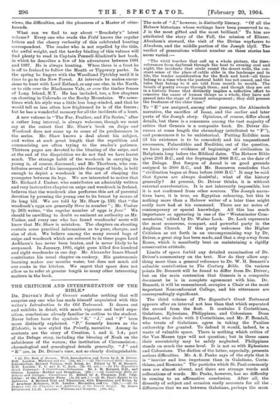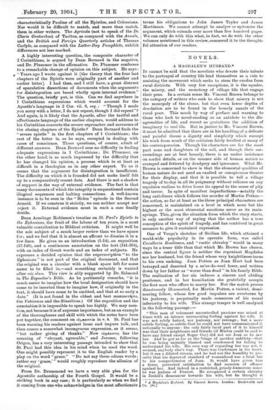THE CRITICISM AND INTERPRETATION OF THE BIBLE.*
DR. DRIVER'S Book of Genesis contains nothing that will surprise any one who has made himself acquainted with this writer's Introduction to the Old Testament. It draws out and exhibits in detail, with much vigorous and lucid expo- sition, conclusions already familiar in outline to the student. Never before have the symbols " E," " J," and " P " been more distinctly explained. " P," formerly known as the Elohistic, is now styled the Priestly, narrative. Among its contents are the story of Creation, i. and ii. 1-4; part of the Deluge story, including the blessing of Noah on the subsidence of the waters ; the institution of Circumcision ; chronological and genealogical details generally. " J." and " E " are, in Dr. Driver's view, not so clearly distinguishable.
• (1) The Book of Genesis. With Introduction and Notes by S. R. Driver, D.D. London : Methuen and Co. [10s. 6d.]—(2) The Century Bible Genesis. Introduction, Revised Version, with Notes, dm Edited by W. H. Bennett, D.D. London : T. C. and E. C. Jack. [2s. 6d. net.] —(3) The Expositor's Greek Testament: 2 Corinthians—Colossians. By J. H. Bernard, D.D., and Others. London: Hodder and Stoughton. [28s.]—(4) Cambridge Bible for Schools and Colleges : Corinthians II. Edited by A. Plummer, D.D. Cam- 2.rldge at the University Press. [1a. 6cL net.]—b)xitiPaurs Epistle to themians. A Revised Test and Translation, with lion and Notes, by J. Armitage Robinson, D.D. London : Macmillan an Co. [12s.]—(6) An Inquiry into the Character and Authorship of the Fourth Gospel. By James Drummond, LL.D. London: Williams and Norgate. [10s. 6d.]
The note of " J," however, is distinctly literary. " Of all the Hebrew historians whose writings have been preserved to us, J is the most gifted and the most brilliant." To him are attributed the story of the Fall, the mission of Eliezer, Abraham's steward, the visit of the Divine wayfarers to Abraham, and the middle portion of the Joseph idyll. The verdict of generations without number on these stories has never varied:—
" The vivid touches that call up a whole picture, the time- references from daybreak through the heat to evening cool and night, the incidents that circle round the desert wells, the con- stant sense of the place of cattle alike in the landscape and in life, the tender consideration for the flock and herd—all these belong to a time when the pastoral habit has not ceased, and the tales that belong to it are told from mouth to month. The breath of poetry sweeps through them ; and though they are set in a historic frame that distinctly implies a reflective effort to conceive the cause of human things as a whole, they have not passed into the stage of learned arrangement ; they still possess the freshness of the elder time."
To " E " are assigned, among other passages, the Abimelech narrative, the sacrifice of Isaac, and the earlier and later parts of the Joseph story. Opinions, of course, differ about details, but there is a consensus among the vast majority of critics that Genesis is a composite book. Dr. Driver dis- cusses at some length the chronology (attributed to " P"), and pronounces it to be unhistorical. Putting Eolithic man (if his existence is to be conceded) and his unquestioned successors, Palaeolithic and Neolithic, out of the question,.
we have positive evidence of beginnings of civilisation in Babylonia long before the Biblical dates. The Hebrew Bible gives 2501 B.C., and the Septuagint 3066 B.C., as the date of the Deluge. But Sargon of Accad is on good grounds. assigned to 3800 B.C., and Mr. Boscawen concludes that " civilisation began at Susa before 5000 B.C." It may be said, that figures are always doubtful ; what of the history generally? At present, Dr. Driver thinks, it is without external corroboration. It is not inherently impossible, but it is not confirmed from other sources. The Joseph narra- tives have, it is true, an Egyptian colouring, but this is nothing more than a Hebrew writer of a later time might easily have had at his command. There are no notes of contemporary or special knowledge. All this has much importance as appearing in one of the " Westminster Com- mentaries," edited by Dr. Walter Lock. Dr. Lock represents the most numerous, compact, and powerful party in the Anglican Church. If this party welcomes the Higher Criticism as set forth in an uncompromising way by Dr.
Driver, a great step has been made, and that a step away from Rome, which is manifestly bent on maintaining a rigidly conservative attitude.
Limits of space forbid any detailed examination of Dr. Driver's commentary on the text. Nor do they allow any-
thing more than a general reference to Dr. W. H. Bennett's valuable contribution to The Century Bible. On various
points Dr. Bennett will be found to differ from Dr. Driver but on the main contention that Genesis is a composite document he is in complete agreement with him. Dr.
Bennett, it will be remembered, occupies a Chair at the most important Nonconformist College, and his utterances are correspondingly significant.
The third volume of The Expositor's Greek Testament appears after an interval not less than that which separated the second from the first. It contains 2 Corinthians,.
Galatians, Ephesians, Philippians, and Colossians. Dean Bernard, who deals with 2 Corinthians, and Mr. F. Randall,.
who treats of Galatians, agree in taking the Pauline authorship for granted. To defend it would, indeed, be a waste of valuable space. There is nothing which critics of the Van Manen type will not question ; but in these cases their eccentricity may be safely neglected. Philippians stands on much the same level. It is not so with Ephesians and Colossians. The diction of the latter, especially, presents serious difficulties. Mr. A. S. Peake says of the style that it is " heavier and less impetuous than in Galatians, Corin- thians, and Romans." The particles which St. Paul commonly uses are almost absent, and there are strange words and collocations of words. Mr. Peake, however, has no difficulty in coming to an affirmative conclusion. After all, the
characteristically Pauline of all the Epistles, and Colossians. Nor would it be difficult to match, and more than match, them in other writers. The Agricola (not to speak of the De Claris Oratoribus) of Tacitus, as compared with the Annals, and the British and Foreign Quarterly articles of Thomas Carlyle, as compared with the Latter-Day Pamphlets, exhibit differences not less marked.
A highly interesting question, the composite character of 2 Corinthians, is argued by Dean Bernard in the negative, and Dr. Plummer in the affirmative. Dr. Plummer confesses to a remarkable change of opinion on this subject. He says :
Years ago I wrote against it [the theory that the four last chapters of the. Epistle were originally part of another and earlier letter]. I had then, and I still have, a great distrust of speculative dissections of documents when the arguments for disintegration are based wholly upon internal evidence." The question, briefly put, is this. Can we find anywhere in 1 Corinthians expressions which would account for the Apostle's language in 2 Cor. vii. 8, seq. : " Though I made you sorry with a letter, I do not repent, though I did repent" P And again, is it likely that the Apostle, after the tactful and affectionate language of the earlier chapters, would address to his Corinthian converts the severe reproaches and sarcasms of the closing chapters of the Epistle P Dean Bernard finds the " severe epistle " in the first chapters of 1 Corinthians ; the rest of the letter is, as he says, occupied in dealing with cases of conscience. These questions, of course, admit of different answers. Dean Bernard sees no difficulty in finding adequate expressions in 1 Corinthians ; Dr. Plummer, on the other hand, is so much impressed by the difficulty that he has changed his opinion, a process which isk at least as difficult in a theologian as in any other expert. To us it seems that the argument for disintegration is insufficient. The difficulty on which it is founded did not make itself felt up to a comparatively recent date. And there is not a shadow of support in the way of external evidence. The fact is that many documents of which the integrity is unquestioned contain illogical sequences and halting connections. A well-known instance is to be seen in the " Helen " episode in the Second Aeneid. If we construe it strictly, we can neither accept nor reject it. External evidence must in such a case finally decide.
Dean Armitage Robinson's treatise on St. Paul's Epistle to the Ephesians, the fruit of the labour of ten years, is a most valuable contribution to Biblical criticism. It might well be the sole subject of a much larger review than we have space for; and we feel that it is almost an affront to dismiss it in a few lines. He gives us an introduction (1-14), an exposition (17-140), and a continuous annotation on the text (141-304), with an index of Greek words and an index of subjects. He expresses a decided opinion that the superscription " to the Ephesians " is not part of the original document, and that the original was a circular with a blank space left for some name to be filled in,—and something certainly is wanted after roil ogatr. This view is ably supported by Dr. Salmond in The Expositor's Bible. As he pertinently remarks, "it is much easier to imagine how the local designation should have come to be inserted than to imagine how, if originally in the text, it should have come to be omitted, and that at so early a date." (It is not found in the oldest and best manuscripts, the Vaticanus and the Sinaiticus.) Of the exposition and the annotation it is impossible to speak too highly. We may men- tion, not because it is of supreme importance, but as an example of the thoroughness and skill with which the notes have been put together, the comment on nixapraria in v. 4. St. Paul has been warning his readers against loose and impure talk, and then comes a somewhat incongruous expression, as it seems, "but rather giving of thanks." Now sixapirroi has the meaning of " elegant, agreeable," and Jerome, following Origen, has a very interesting passage intended to show that St. Paul had this idea in his mind when he used the word. One might possibly represent it to the English reader by a play on the word " grace." " Do not say these odious words; rather say grace," would roughly reproduce the allusion of the original.
From Dr. Drummond we have a very able plea for the Apostolic authorship of the Fourth Gospel. It would be a striking book in any case; it is particularly so when we find it coming from one who acknowledges in the most affectionate ,
terms his obligations to John James Tayler and James Martineau. We cannot attempt to analyse or epitomise the argument, which extends over more than five hundred pages. We can only do with this what, in fact, we do with the other volumes mentioned in this review, commend it to the thought- ful attention of our readers.











































 Previous page
Previous page